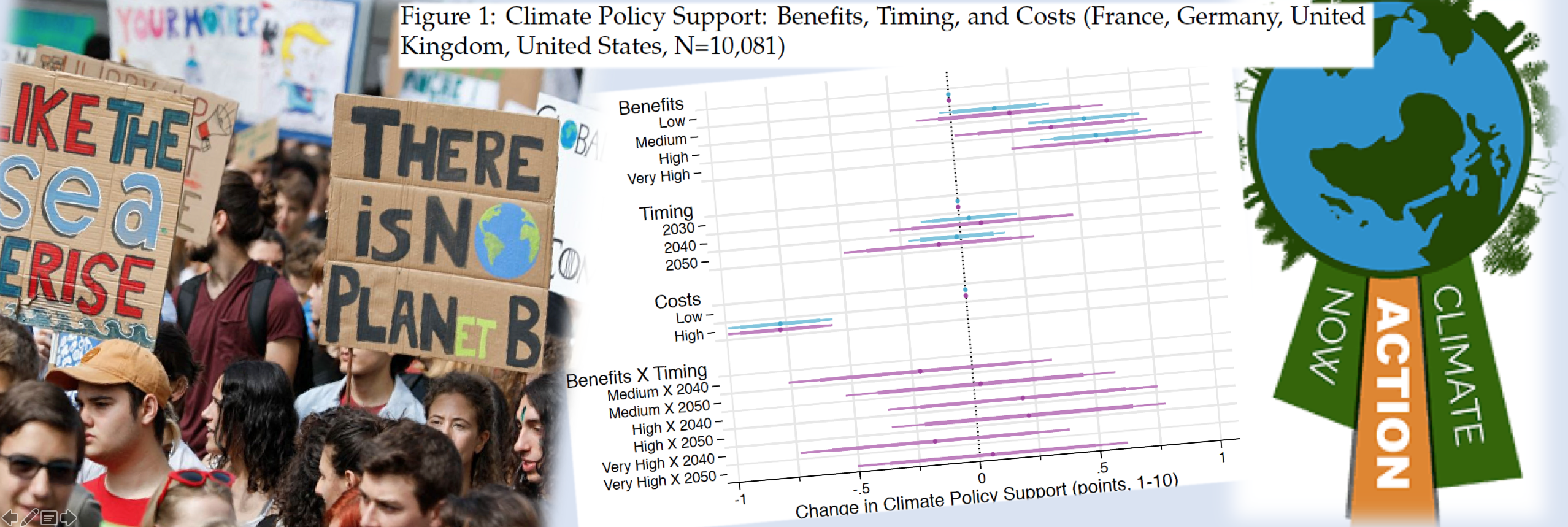Working Papers
Working Paper

Foreign Policy Interests and International Disaster Assistance
with Jeffrey Ziegler
First posted: November 2019
Abstract
How does international financial assistance reflect strategic political interests? The “buying influence” argument predicts that countries provide more support to governments that pursue antithetical foreign policy objectives to induce favorable policy shifts. However, such efforts seem unlikely to persuade highly antithetical governments to engage in drastic policy changes and may not be necessary if a recipient country already pursues compatible foreign policies. We analyze international responses to natural disasters using data for 203 countries from 2000 to 2014 and find that donors provide more relief to countries whose foreign policies are moderately aligned. We also explore donors’ delivery tactics and find that the probability of providing disaster assistance directly to the recipient country’s government is more likely as political affinity with the donor country increases. Overall, the relationships between foreign policy interests and international assistance seem more consistent with a political efficiency logic than with the standard buying influence argument.
Download
Working Paper
Articles in Refereed Journals
Article
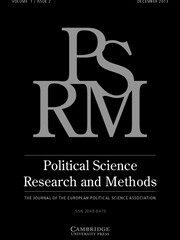
Measuring Time Preferences in Large Surveys
with Amalie Sofie Jensen, Jordan McAllister, and Kenneth F. Scheve
Political Science Research and Methods (2024) 12 (2): 426-434.
First posted: July 2019
Abstract
Time preferences may explain public opinion about a wide range of long-term policy problems whose costs and benefits will be realized in the distant future. However, mass publics may discount these costs and benefits because they are later or because they are more uncertain. Standard methods to elicit individual-level time preferences tend to conflate attitudes toward risk and time and are susceptible to social desirability bias. A potential solution relies on a costly lab-experimental method, convex time budgets (CTB). We present and experimentally validate an affordable version of this approach for implementation in mass surveys. We find that the theoretically preferred CTB patience measure predicts attitudes toward a local, delayed investment problem but fails to predict support for more complex, future-oriented policies. These results have implications for studying the mass politics of dynamic policy problems.
Download
Media
Article
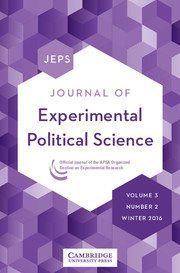
Can Policy Responses to Pandemics Reduce Mass Fear?
with William O’Brochta and Margit Tavits
Journal of Experimental Political Science (2023) 10 (3): 343-353.
First posted: November 2020
Abstract
To successfully address large-scale public health threats such as the novel coronavirus outbreak, policymakers need to limit feelings of fear and anxiety that threaten social order and political stability. We study how policy response to an infectious disease affects mass fear using data from a survey experiment conducted on a representative sample of the adult population in the United States (N=5,461). We find that fear and anxiety are strongly affected by the final policy outcome, relatively mildly by the severity of the initial outbreak, and minimally by policy response type and rapidity. This result holds across various subgroups of individuals regardless of their partisan identification, level of exposure to coronavirus, knowledge of the virus, and several other theoretically relevant characteristics.
Download
Media
Article
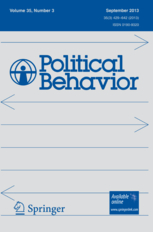
Ready When the Big One Comes? Natural Disasters and Mass Support for Preparedness Investment
with Massimo Mannino
Political Behavior (2023) 45: 1045-1070.
First posted: February 2017
Abstract
Societies can address collective threats such as natural disasters or pandemics by investing in preparedness (ex ante) or by offering compensation after an adverse event has occurred (ex post). What explains which of these options voters prefer? We study how personal exposure and policy knowledge affect mass support for long-term disaster preparedness, a type of long-term investment meant to cope with an increasingly destructive and frequent class of events. We first assess whether support for preparedness reflects personal experience and find that neither subjective nor geo-coded measures of disaster exposure predict policy preferences. Second, we explore whether this finding can be explained by misperceptions about the features of the available policy options. We find that revealing the damage reductions associated with preparedness strongly reduces opposition to long-term investment. These results suggest that opposition to preparing for collective threats may depend more on informational deficiencies than on personal experience with realized risks.
Download
Media
Article

Improving Public Support for Climate Action Through Multilateralism
with Kenneth F. Scheve and Elisabeth van Lieshout
Nature Communications (2022) 13: 6441.
Abstract
For decades, policymakers have been attempting to negotiate multilateral climate agreements. One of the motivations for securing cooperation among multiple states is the belief that the public will be more supportive of adopting costly climate policies if other countries do so, both because this makes it more likely that important sustainability goals will be reached and because those efforts resonate with widely held fairness norms. However, some recent research suggests that public approval of climate action is independent of the policy choices made by other countries. Here, we present two different experimental studies fielded in multiple countries showing that multilateralism significantly increases public approval of costly climate action. Multilateralism makes climate policy more appealing by improving effectiveness beliefs and the policy’s perceived fairness. Pursuing climate action within a multilateral setting does not only promise improved policy impacts, but may also generate higher levels of public support.
Download
Media
Article

Retrospection, Fairness, and Economic Shocks: How Do Voters Judge Policy Responses to Natural Disasters?
with Massimo Mannino
Political Science Research and Methods (2022) 115 (2): 486-505.
First posted: April 2017
Abstract
Which factors explain voters’ evaluations of policy responses to economic shocks? We explore this question in the context of mass preferences over the distribution of disaster relief and evaluate three theoretical arguments related to fairness norms that highlight affectedness, need, and political ties. We analyze experimental data from an original survey conducted among American citizens and find that affectedness and need are important drivers of voters’ preferred disaster responses. We then compare these patterns with observed disaster relief distributions (1993-2008). The results suggest that observed relief allocations largely mirror the structure of voter preferences with respect to affectedness and need, but not political ties. These findings have implications for an ongoing debate over the electoral effects of natural disasters, voters’ retrospective evaluations of incumbent performance, and the extent to which divide-the-dollar politics decisions align with mass preferences.
Download
Article
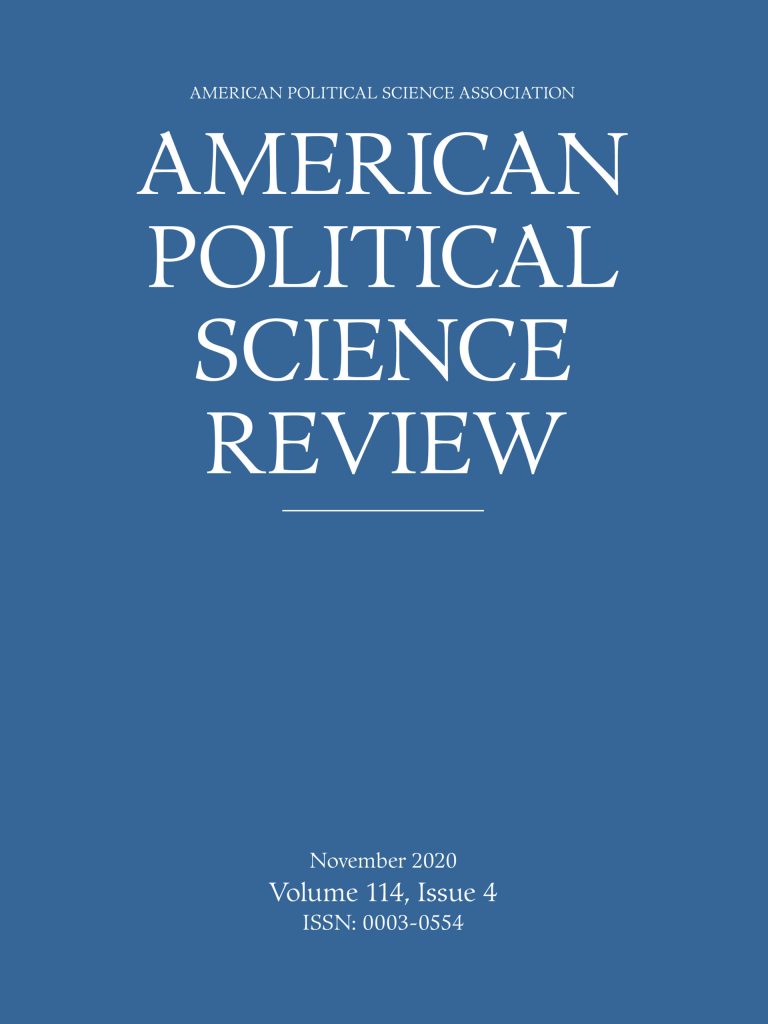
Why Austerity? The Mass Politics of a Contested Policy
with Kirk Bansak and Yotam Margalit
American Political Science Review (2021) 115 (2): 486-505.
First posted: November 2019
Abstract
The merits of austerity as a response to economic crisis are widely contested. Critics contend that public spending cuts and tax hikes inflict more pain and are less effective than the alternative of fiscal stimulus. Nonetheless, governments routinely adopt austerity in response to sharp economic downturns. We explore this puzzle by focusing on public opinion as a key component of understanding governments’ choices. Using original survey data from five European countries, our analysis demonstrates that austerity is in fact the preferred response among most voters. We then test potential explanations for this seemingly surprising preference using experiments. The results suggest that voters’ ideology and reliance on partisan signals are an important part of the answer. Moreover, support for austerity is highly contingent on the specific features of the policy. We devise a novel approach to predict support for historical austerity programs and find that public approval of austerity likely reflects governments’ strategic crafting of policy packages.
Download
Media
Article

Electoral Reforms and the Representativeness of Turnout
with Lukas Schmid
Political Science Research and Methods (2021) 9 (3): 485-499.
First posted: May 2016
Abstract
Voters tend to be richer, more conservative, and more educated than non-voters. While many electoral reforms promise to increase political participation, these policy instruments may have multidimensional and differential effects that can increase or decrease the representativeness of turnout. We develop an approach that allows us to estimate these effects and assess the impact of postal voting on representational inequality in Swiss referendums using individual-level (N=79,000) and aggregate-level data from 1981 to 2009. We find that postal voting mobilizes equally across a wide range of political and sociodemographic groups but more strongly activates high earners, those with medium education levels, and less politically interested individuals. Yet, those who vote are not less politically knowledgeable and the effects on the composition of turnout remain limited. Our results inform research on the consequences of electoral reforms meant to increase political participation in large electorates.
Download
Article

Constant Carbon Pricing Increases Support for Climate Action Compared to Ramping Up Costs Over Time
with Kenneth F. Scheve and Elisabeth van Lieshout
Nature Climate Change (2020) 10 (11): 1004-1009.
Abstract
The introduction of policies that increase the price of carbon is central to limiting the adverse effects of global warming. Conventional wisdom holds that, of the possible cost paths, gradually raising costs relating to climate action will receive the most public support. Here, we explore mass support for dynamic cost paths in four major economies (France, Germany, the United Kingdom and the United States). We find that, for a given level of average costs, increasing cost paths receive little support whereas constant cost schedules are backed by majorities in all countries irrespective of whether those average costs are low or high. Experimental evidence indicates that constant cost paths significantly reduce opposition to climate action relative to increasing cost paths. Preferences for climate cost paths are related to the time horizons of individuals and their desire to smooth consumption over time.
Download
Media
Article
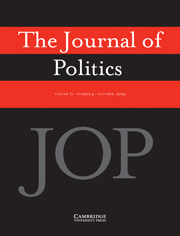
Left-Right Ideology and the Debate over International Bailouts: The Case of Grexit
with Kirk Bansak, Jens Hainmueller, and Yotam Margalit
Journal of Politics (2020) 82 (2) 509-528.
First posted: January 2016
Abstract
What explains the sharp divide among European publics over the Grexit? We explore this question using original surveys from four of the largest European economies. We contend that differences in citizens’ own economic interests, as well as the often-mentioned chasm between supporters of mainstream and extremist parties, provide little insight into the public divide over the Grexit. Instead, we show that the key factor is the split between the left and right. We then develop and test a set of theoretical explanations for this cleavage. We find that the left-right divide over the Grexit is not driven by differences in attitudes on redistribution, levels of empathy, or general EU support. Instead, we find that the primary mechanism is that left and right voters have different expectations about the impact of a Grexit on the European economy as a whole. These expectations largely reflect differences in core beliefs about the promise of a free-market approach.
Download
Article
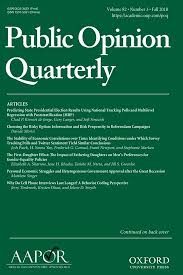
Reforms and Redistribution: Disentangling the Egoistic and Sociotropic Origins of Voter Preferences
with Roman Liesch
Public Opinion Quarterly (2020) 84 (1): 1-23.
First posted: February 2017
Abstract
The economic effects of policy options help explain why individuals support some reforms while they oppose others. However, disentangling the egoistic and sociotropic origins of voter preferences has proven difficult. We conduct an experiment that details how a reform affects one’s personal income, the average income in the country, and different income groups. The results suggest that the causal effect of personal income changes on reform support is about twice the size of changes in a country’s income average. Voters specifically care about how reforms impact the poor and this pro-social concern does neither depend on their own income level nor on how a policy will affect them personally. We find that these patterns characterize how voters evaluate the redistributive effects of generic economic policies, health care reforms, trade policy decisions, and the policy platforms of candidates running for office.
Download
Article
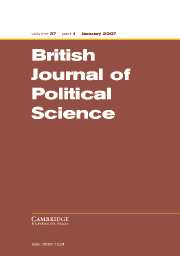
Interests, Norms and Support for the Provision of Global Public Goods: The Case of Climate Co-operation
with Federica Genovese and Kenneth F. Scheve
British Journal of Political Science (2019) 49 (4): 1333-1355.
First posted: November 2014
Abstract
Mitigating climate change requires countries to provide a global public good. As with most public goods, domestic political conflict is a central determinant of its provision. Which cleavages underlie mass attitudes toward international climate policy? We argue that asymmetries in industry-specific costs of emission abatement and internalized social norms help explain support for climate policy. To test our predictions we develop novel measures of individuals’ sector-dependent costs of climate change mitigation using objective industry-level pollution data and employ quasi-behavioral measures of social norms. Our results suggest that the expected industry-specific costs of climate regulation as well as norms such as reciprocity and altruism help explain why some individuals support climate policy while others do not. These findings have important implications for scholarship on individual policy preferences and for our understanding of the domestic politics of international climate cooperation.
Download
Media
Article

Inequality and Redistribution Behavior in a Give-or-Take Game
with Roman Liesch and Kenneth F. Scheve
Proceedings of the National Academy of Sciences (2018), 115 (14): 3611-3616.
Abstract
Political polarization and extremism are widely thought to be driven by the surge in economic inequality in many countries around the world. Understanding why inequality persists depends on knowing the causal effect of inequality on individual behavior. We study how inequality affects redistribution behavior in a randomized “give-or-take” experiment that created equality, advantageous inequality, or disadvantageous inequality between two individuals before offering one of them the opportunity to either take from or give to the other. We estimate the causal effect of inequality in representative samples of German and American citizens (n = 4,966) and establish two main findings. First, individuals imperfectly equalize payoffs: On average, respondents transfer 12% of the available endowments to realize more equal wealth distributions. This means that respondents tolerate a considerable degree of inequality even in a setting in which there are no costs to redistribution. Second, redistribution behavior in response to disadvantageous and advantageous inequality is largely asymmetric: Individuals who take from those who are richer do not also tend to give to those who are poorer, and individuals who give to those who are poorer do not tend to take from those who are richer. These behavioral redistribution types correlate in meaningful ways with support for heavy taxes on the rich and the provision of welfare benefits for the poor. Consequently, it seems difficult to construct a majority coalition willing to back the type of government interventions needed to counter rising inequality.
Download
Media
Article
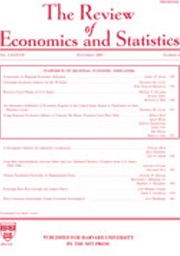
Compulsory Voting, Habit Formation, and Political Participation
with Dominik Hangartner and Lukas Schmid
Review of Economics and Statistics (2018), 100 (3): 467-476.
First posted: August 2011
Abstract
Can compulsory voting induce lasting changes in citizens’ voting habits? We study the long-term and spillover effects of a severely sanctioned and long-standing compulsory voting law in the Swiss canton of Vaud (1900-1970). Our findings suggest that compulsory voting strongly increases turnout in federal referendums by about 30 percentage points. However, this effect returns to zero quickly after voting is no longer compulsory. Moreover, we find only minor spillover effects on related forms of political participation. These spillover effects are limited to referendums that were concurrent with referendums for which voting was compulsory. These results question habit formation arguments in the context of compulsory voting laws. Instead, our findings are consistent with a rationalist model of political participation in which individuals quickly adapt to changes in the costs of non-voting.
Download
Media
Article
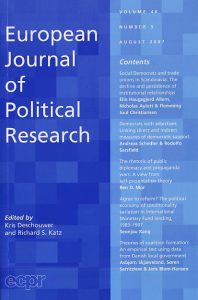
Policy Design and Domestic Support for International Bailouts
with Jens Hainmueller and Yotam Margalit
European Journal of Political Research (2017) 56 (4): 864–886.
First posted: October 2012
Abstract
Financial bailouts for ailing Eurozone countries face deep and widespread opposition among voters in donor countries, casting major doubts over the political feasibility of further assistance efforts. What is the nature of the opposition and under what conditions can governments obtain broader political support for funding such large-scale, international transfers? Addressing this question, we distinguish theoretically between ‘fundamental’ versus ‘contingent’ attitudes. Whereas the former entail complete rejection or embrace of a policy, contingent attitudes depend on the specific features of the policy and could shift if those features are altered. Combining unique data from an original survey in Germany, the largest donor country, together with an experiment that varies salient policy dimensions, our analysis indicates that less than a quarter of the public exhibits fundamental opposition to the bailouts. Testing a set of theories on contingent attitudes, we find particular sensitivity to the burden-sharing and cost dimensions of the bailouts. Our results imply that the choice of specific features of a rescue package has important consequences for building domestic support for international assistance efforts.
Download
Article

Who Cooperates? Reciprocity and the Causal Effect of Expected Cooperation in Representative Samples
with Kenneth F. Scheve
Journal of Experimental Political Science (2017) 4 (3): 206–228.
First posted: April 2014
Abstract
When do societies succeed in providing public goods? Previous research suggests that public goods contributions correlate with expectations about cooperation by others among students and other demographic subgroups. However, we lack knowledge about whether the effect of expected cooperation is causal and a general feature of populations. We fielded representative surveys (N=8,500) in France, Germany, the United Kingdom, and the United States that included a public goods game and a novel between-subjects experiment. The experiment varied expectations about cooperation by others. We find that higher expected cooperation by others causes a significant increase in individual contributions. When classifying contribution schedules we find that almost 50% of the population employs a conditionally cooperative strategy. These individuals are on average richer, younger and more educated. Our results help explain the varying success of societal groups in overcoming cooperation problems and assist policymakers in the design of institutions meant to solve social dilemmas.
Download
Article
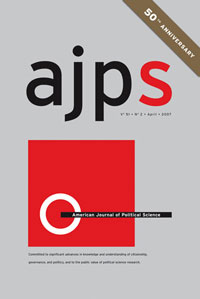
Does Compulsory Voting Increase Support for Leftist Policy?
with Dominik Hangartner and Lukas Schmid
American Journal of Political Science (2016) 60 (3): 752–767.
First posted: November 2013
Abstract
Citizens unequally participate in referendums, and this may systematically bias policy in favor of those who vote. Some view compulsory voting as an important tool to alleviate this problem, whereas others worry about its detrimental effects on the legitimacy and quality of democratic decision making. So far, however, we lack systematic knowledge about the causal effect of compulsory voting on public policy. We argue that sanctioned compulsory voting mobilizes citizens at the bottom of the income distribution and that this translates into an increase in support for leftist policies. We empirically explore the effects of a sanctioned compulsory voting law on direct-democratic decision making in Switzerland. We find that compulsory voting significantly increases electoral support for leftist policy positions in referendums by up to 20 percentage points. We discuss the implications of these results for our understanding of the policy consequences of electoral institutions.
Download
- Article (open access)
- Web Appendix
- Replication Archive
Media
Article

All Policies Are Glocal: International Environmental Policymaking with Strategic Subnational Governments
with Johannes Urpelainen
British Journal of Political Science (2015) 45 (3): 559-582.
First posted: April 2011
Abstract
National governments have intensified their attempts to create international institutions in various policy fields such as the environment, finance and trade. At the same time, many subnational policy makers have begun to duplicate international efforts by setting their own, stricter policies while others remain inactive or enact more lax regulation. This ‘glocalization’ of policy creates a complex and potentially costly patchwork system of regulations. To shed light on this phenomenon, this article analyzes the interaction between subnational and national governments within a game-theoretic model of international treaty negotiations. The glocalization of regulatory policy can be understood as an attempt by subnational policy makers to strategically constrain or empower national governments in international negotiations. The study finds that the shadow of international treaty formation gives rise to within-country and cross-country policy balancing dynamics that may explain some of the subnational policy polarization that is currently observable in many countries. The article specifies the conditions under which these dynamics occur, spells out empirically testable hypotheses and identifies possible theoretical extensions.
Download
- Article (open access)
- Web Appendix
Media
Article

What Is Litigation in the World Trade Organization Worth?
with Thomas Sattler
International Organization (2015) 69 (2): 375-403.
First posted: December 2011
Abstract
Conventional wisdom holds that the creation of international, court-like institutions helps countries to peacefully settle trade conflicts, thereby enhancing overall welfare. Many have argued, however, that these institutions remain ultimately ineffective because they merely reflect the distribution of power in the anarchic international system. We argue that international litigation provides economic spillovers that create opportunities for judicial free-riding and explore empirically how litigation in the World Trade Organization affects bilateral trade between countries involved in a trade dispute. We use a matching approach to compare the dynamics of trade flows between countries that experienced a panel ruling with trade relations of observably similar country pairs that did not experience a ruling. Based on this comparison we find that sectoral exports from complainant countries to the defendant increase by about $7.7 billion in the three years after a panel ruling. However, countries that have proactively filed a complaint and carried the main costs of litigation do not systematically gain more than less-active third parties that merely joined an existing trade dispute. This suggests that international judicial institutions can provide positive economic externalities and may thereby lead to a less power-based distribution of the gains from trade.
Download
Media
Article
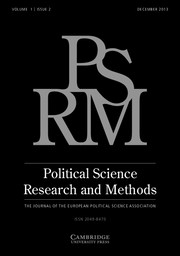
Reality Bites: The Limits of Framing Effects in Salient Policy Decisions
with Jens Hainmueller, Dominik Hangartner, and Marc Helbling
Political Science Research and Methods (2015) 3 (3): 683-695.
First posted: March 2012
Abstract
A large literature argues that public opinion is vulnerable to various types of framing and cue effects. However, we lack evidence on whether existing findings, which are typically based on lab experiments involving low salience issues, travel to salient and contentious political issues in real-world voting situations. We examine the relative importance of issue frames, partisan cues, and their interaction for opinion formation using a survey experiment conducted around a highly politicized referendum on immigration policy in Switzerland. We find that voters responded to frames and cues, regardless of their direction, by increasing support for the position that is in line with their pre-existing partisan attachment. This reinforcement effect was most visible among low knowledge voters that identified with the party that owned the issue. These results support some of the previous findings in the political communication literature, but at the same time also point toward possible limits to framing effects in the context of salient and contested policy issues.
Download
Article

Preferences for International Redistribution: The Divide Over the Eurozone Bailouts
with Jens Hainmueller and Yotam Margalit
American Journal of Political Science (2014) 58 (4): 835-856.
First posted: April 2012
Abstract
Why do voters agree to bear the costs of bailing out other countries? Despite the prominence of public opinion in the ongoing debate over the eurozone bailouts, voters’ preferences on the topic are poorly understood. We conduct the first systematic analysis of this issue using observational and experimental survey data from Germany, the country shouldering the largest share of the EU’s financial rescue fund. Testing a range of theoretical explanations, we find that individuals’ own economic standing has limited explanatory power in accounting for their position on the bailouts. In contrast, social dispositions such as altruism and cosmopolitanism robustly correlate with support for the bailouts. The results indicate that the divide in public opinion over the bailouts does not reflect distributive lines separating domestic winners and losers. Instead, the bailout debate is better understood as a foreign policy issue that pits economic nationalist sentiments versus greater cosmopolitan affinity and other-regarding concerns.
Download
- Article (open access)
- Supporting Information
- Replication Archive
Media
Article

Mass Support for Climate Cooperation Depends on Institutional Design
with Kenneth F. Scheve
Proceedings of the National Academy of Sciences (2013) 110 (34): 13763-13768.
Abstract
Effective climate mitigation requires international cooperation, and these global efforts need broad public support to be sustainable over the long run. We provide estimates of public support for different types of climate agreements in France, Germany, the United Kingdom, and the United States. Using data from a large-scale experimental survey, we explore how three key dimensions of global climate cooperation—costs and distribution, participation, and enforcement—affect individuals’ willingness to support these international efforts. We find that design features have significant effects on public support. Specifically, our results indicate that support is higher for global climate agreements that involve lower costs, distribute costs according to prominent fairness principles, encompass more countries, and include a small sanction if a country fails to meet its emissions reduction targets. In contrast to well-documented baseline differences in public support for climate mitigation efforts, opinion responds similarly to changes in climate policy design in all four countries. We also find that the effects of institutional design features can bring about decisive changes in the level of public support for a global climate agreement. Moreover, the results appear consistent with the view that the sensitivity of public support to design features reflects underlying norms of reciprocity and individuals’ beliefs about the potential effectiveness of specific agreements.
Download
Media
- Huffington Post
- Washington Post’s Monkey Cage
- Moneycab
- Swissinfo.ch
- FSI Stanford News
- Global Environmental Society
- 4-traders.com
- GoLocalProv
- Phys.org
- Futurity
- HSG Focus
- 19 tweets with an upper bound of over 64,000 combined followers (article metrics)
Article
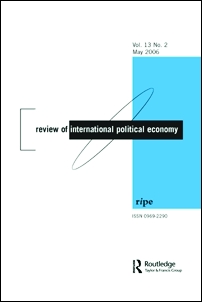
The Green Side of Protectionism: Environmental Concerns and Three Facets of Trade Policy Preferences
with Thomas Bernauer and Reto Meyer
Review of International Political Economy (2012) 19 (5): 837-866.
First posted: December 2010
Abstract
A large literature in international political economy views individuals’ trade policy preferences as a function of the income effects of economic openness. We argue that the expected environmental consequences of free trade play a noteworthy role for protectionist attitudes that has not been noted so far. We use unique Swiss survey data that contain measures of individuals’ environmental concerns and different aspects of trade policy preferences to examine whether those who are more concerned about the environment also hold more protectionist trade policy preferences. Our results support this expectation. Individuals who are more concerned about the environment tend to think that globalization has more negative than positive effects, more strongly support jobs-related protectionism, and place more emphasis on aspects that go beyond price and quality when evaluating foreign products. Our results suggest that also the expected environmental consequences of free trade matter for trade policy preferences and not just the potential effects on the domestic wage distribution.
Download
Article
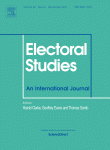
Not Always Second Order: Subnational Elections, National-level Vote Intentions, and Volatility Spillovers in a Multi-level Electoral System
Electoral Studies (2012) 31 (1): 170-183.
First posted: October 2011
Abstract
The widespread second-order view on subnational elections leaves little room for the idea that subnational election campaigns matter for national-level electoral preferences. I challenge this perspective and explore the context-conditional role of subnational election campaigns for national-level vote intentions in multi-level systems. Campaigns direct citizens’ attention to the political and economic “fundamentals” that determine their electoral preferences. Subnational election campaigns and the major campaign issues receive nation-wide media coverage. This induces all citizens in a country to evaluate parties at the national level even if they themselves are not eligible to vote in the upcoming subnational election. Thereby, subnational election campaigns may lead to a reduction in the uncertainty of voters’ national-level electoral preferences throughout the country, which is reflected by a decrease in the volatility of national-level vote intentions. I explore weekly vote intention data from Germany (1992–2007) within a conditional volatility model. Subnational elections reduce uncertainty in nation-wide federal-level vote intentions for major parties. However, patterns of incumbency and coalitional shifts moderate this volatility-reducing effect.
Download
- Article
- web appendix (coming soon)
- Replication Archive
Article

How Lasting Is Voter Gratitude? An Analysis of the Short- and Long-term Electoral Returns to Beneficial Policy
with Jens Hainmueller
American Journal of Political Science (2011) 55 (4): 852-868.
First posted: December 2010
Abstract
Dominant theories of electoral behavior emphasize that voters myopically evaluate policy performance and that this shortsightedness may obstruct the welfare-improving effect of democratic accountability. However, we know little about how long governments receive electoral credit for beneficial policies. We exploit the massive policy response to a major natural disaster, the 2002 Elbe flooding in Germany, to provide an upper bound for the short- and long-term electoral returns to targeted policy benefits. We estimate that the flood response increased vote shares for the incumbent party by 7 percentage points in affected areas in the 2002 election. Twenty-five percent of this short-term reward carried over to the 2005 election before the gains vanished in the 2009 election. We conclude that, given favorable circumstances, policy makers can generate voter gratitude that persists longer than scholarship has acknowledged so far, and elaborate on the implications for theories of electoral behavior, democratic accountability, and public policy.
Download
- Article (open access)
- Web Appendix
- Replication Archive
Media
- Vox (2020)
- Vox (2021)
- Washington Monthly Blog
- ZEITmagazin
- NZZ
- Zurich Political Science Blog
Article
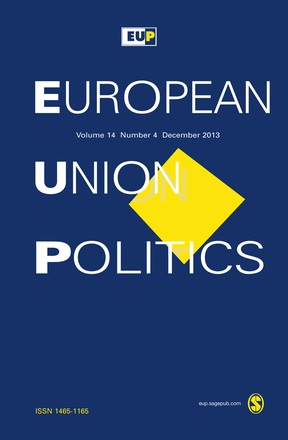
Forecasting European Union Politics: Real-time Forecasts in Political Time Series Analysis
with Dirk Leuffen
European Union Politics (2010) 11 (2): 309-327.
First posted: March 2010
Abstract
Forecasting plays an increasingly important role in the scientific study of European Union politics and in political science in general. This is because forecasts are not only indispensable for (political) actors who need to form expectations about future events, but can also be used to judge the validity of (competing) theoretical models. While the debate about whether political science should engage in forecasting is largely over, many questions about how this should be done in everyday research are still open. One of these is how forecasts of political time series can be derived from theoretical models. Using a practical example from European Union research, we start to address this question. We first show how forecasts of political time series can be derived from both theoretical and atheoretical models. Subsequently, we use an atheoretical time series (ARMA) imputation approach to demonstrate how they can be fruitfully integrated in order to overcome some of the limitations to making forecasts of political time series which are based on theoretical models.
Download
- Article (open access)
- Web Appendix
Article

Eliciting Substance from ‘Hot Air’: Financial Market Responses to EU Summit Decisions on European Defense
with Gerald Schneider
International Organization (2010) 64 (2): 199-223.
First posted: February 2009
Abstract
The results of deliberations in multilateral fora are often considered ineffective. Decision making in the European Union (EU) and in particular its key intergovernmental body, the European Council, poses no exception. Especially in the domain of EU foreign and security affairs, the unanimity requirement governing this institution allegedly allows nationalist governments to torpedo any attempt to build up a credible European defense force and a unified foreign policy stance. In this article, we take issue with the claim that multilateral summits merely result in “hot air” by looking at whether and how decisions made during EU summit meetings affect the European defense industry. We argue that investors react positively to a successful strengthening of Europe’s military component—a vital part of the intensified cooperation within the European Security and Defense Policy (ESDP)—since such decisions increase the demand for military products and raise the expected profits in the European defense industry. Our findings lend empirical support to the view that financial markets indeed evaluate the substance of European Council meetings and react positively to those summit decisions that consolidate EU military capabilities and the ESDP. Each of the substantial council decisions studied increased the value of the European defense sector by about 4 billion euros on average. This shows that multilateral decisions can have considerable economic and financial repercussions.
Download
Article

Capitalizing on Partisan Politics: The Political Economy of Sector-Specific Redistribution in Germany
with Roland Füss
Journal of Money, Credit and Banking (2010) 42 (2-3): 203-235.
First posted: February 2007
Abstract
This paper studies the redistributive effects of government partisanship on economic sectors in a parliamentary democracy. Based on a rational partisan perspective and policy-induced campaign contribution models, we expect that once in office, ideologically different parties deliver favorable policies to different industries in order to enrich their electoral and sector-specific supporters. Using daily stock market data, we empirically evaluate whether and how the mean and the volatility of returns to four important economic sectors co-varied with the electoral prospects of a right-/left-leaning coalition in Germany from 1991 to 2005. This sheds light on the magnitude of sector-specific redistribution to be expected from ideologically different governments holding office. The results show that the mean and the volatility of defense and pharmaceutical sector returns increase if a right-leaning government is becoming more likely to win the upcoming election. In contrast, an increase in the probability of a left-leaning government triggers higher returns to the alternative energy sector and increases the volatility of consumer sector returns. Thus, our estimates partly support the idea that parties redistribute across sectors.
Download
Media
Article

The Political Sources of Systematic Investment Risk: Lessons from a Consensus Democracy
Journal of Politics (2009) 71 (2): 661–677.
Abstract
This study examines the relationships between democratic politics and systematic investment (or capital) risk. Low risk is crucial to any well-functioning economy, as it encourages capital investment, facilitates growth, and enhances overall economic performance. This article distinguishes preelectoral, postelectoral, and institutional factors and examines how these influence systematic investment risk using daily stock market data from Germany. The results suggest that more (less) favorable and reliable investment conditions during the incumbency of right (left)-leaning governments lead to lower (higher) investment risk. This partisan effect is stronger the more inflation increases and depends on whether government is unified or divided. Investors also anticipate the effect of government partisanship: systematic risk decreases (increases) if the electoral prospects of a right (left)-leaning government enhance. Finally, grand coalition governments as well as periods of coalition formation trigger higher investment risk.
Download
Article
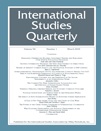
Changing Economic Openness for Environmental Policy Convergence: When Can Trade Agreements Induce Convergence of Environmental Regulation?
with Jale Tosun
International Studies Quarterly (2009) 53 (4): 931-953.
Abstract
Citizens’ concerns about (international) environmental protection standards are of increasing importance to governments in industrially advanced, high-regulating countries. In almost any proposal for a trade agreement, countries with low environmental regulation standards are required to introduce higher policy standards in exchange for high-regulating countries dismantling their trade barriers and granting access to their domestic markets. Low-regulating countries often act as required and introduce legislation aimed at reducing pollution. This leads to declaratory or de jure policy convergence. But such legislative action is not always associated with de facto or actual policy convergence, since policies are not always enforced. To analyze the strategic aspect of this potential “slippage,” we set up a game-theoretic model with imperfect information. In the model, a high-regulating and a low-regulating country negotiate a bilateral free trade agreement with environmental provisions. We show how potential gains from trade, policy enforcement, and reputation costs, as well as domestic demands for environmental protection affect the occurrence of environmental policy convergence through conditional trade agreements. This study thereby advances our understanding of the relationship between bilateral trade and convergence of environmental policies.
Download
Article
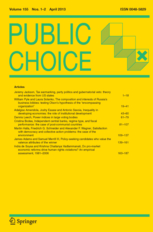
Partisan Politics and Stock Market Performance: The Effect of Expected Government Partisanship on Stock Returns in the 2002 German Federal Election
with Roland Füss
Public Choice (2008) 135 (3-4): 131-150.
Abstract
Rational partisan theory suggests that firms perform better under right- than left-
leaning governments. In the pre-election time, investors should anticipate these effects of government partisanship. This is the first study to investigate such anticipated partisan effects in Germany. Applying conditional volatility models we analyze the impact of expected government partisanship on stock market performance in the 2002 German federal election. Our results show that small-firm stock returns were positively (negatively) linked to the probability of a right- (left-) leaning coalition winning the election. Moreover, we find that volatility increased as the electoral prospects of right-leaning parties improved, while
greater electoral uncertainty had a volatility-reducing effect.
Download
Media
Article
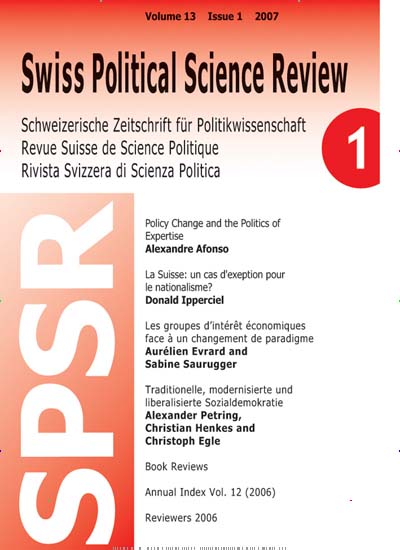
When Investors Enjoy Less Policy Risk: Divided Government, Economic Policy Change, and Stock Market Volatility in Germany, 1970-2005
with Roland Füss
Swiss Political Science Review (2008) 14 (2): 287-314.
Abstract
How does divided government affect the probability of economic policy change, and
thus policy risk on financial markets? In contrast to the standard balancing model we
argue that divided government, i.e., partisan conflict between the executive and the legislative branches, negatively affects the possibility of economic policy change. Using
a simple spatial model we demonstrate that one should expect divided government to increase the probability of policy gridlock. Since divided government reduces the probability of economic policy change, financial markets can operate under lower policy risk in times of divided than in periods of unified government. For the empirical evaluation we exploit the fact that stock return volatility provides us with a measure of risk. If the gridlock argument does hold, stock return fluctuations should be lower under divided than under unified government. Our results confirm that divided government has a volatility reducing effect on the German stock market. This supports the view that divided government lowers policy risk.
Download
Books
Book
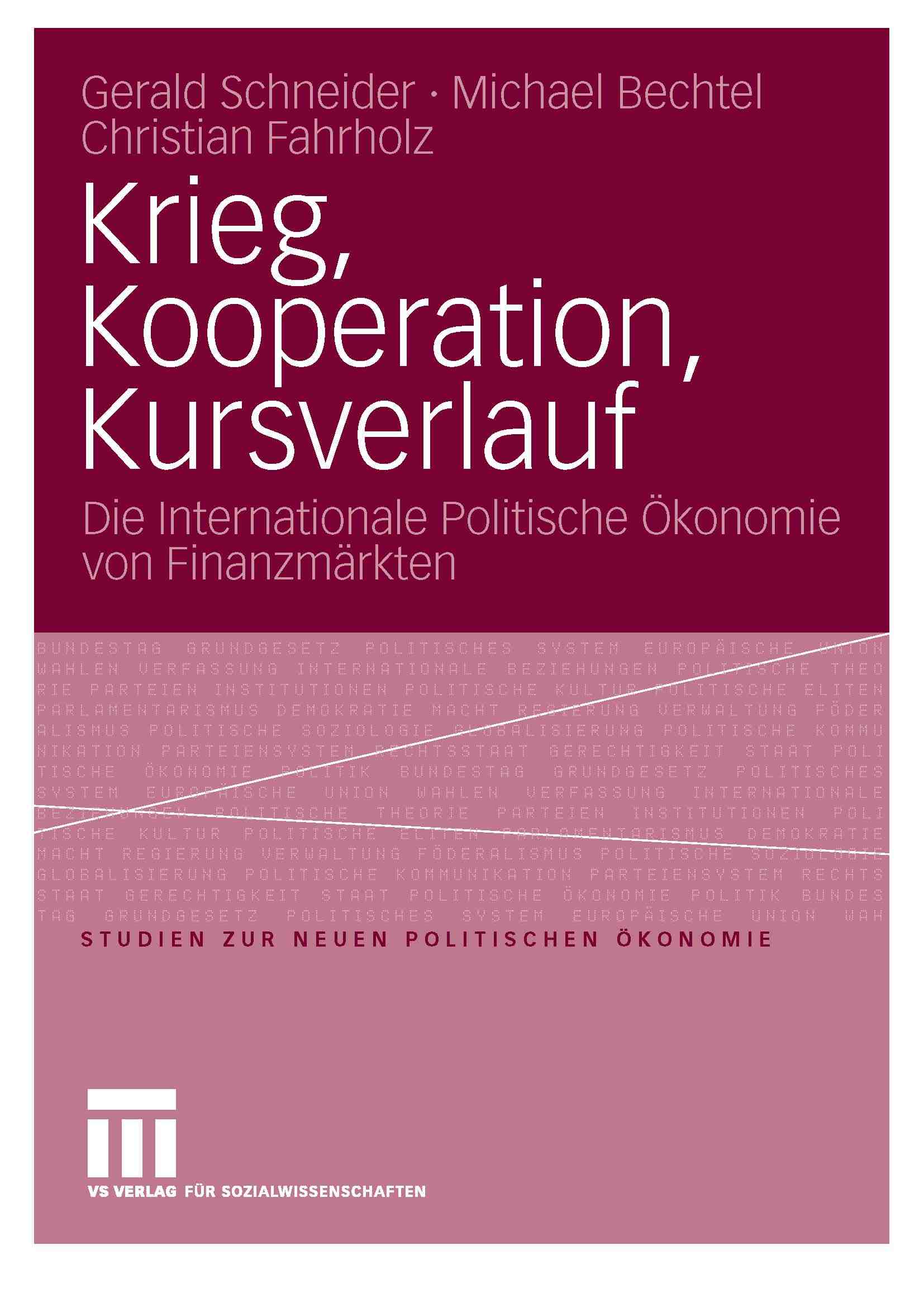
Krieg, Kooperation, Kursverlauf. Die Internationale Politische Ökonomie von Finanzmärkten.
Co-authored with Christian Fahrholz and Gerald Schneider
VS Verlag
Review
Book
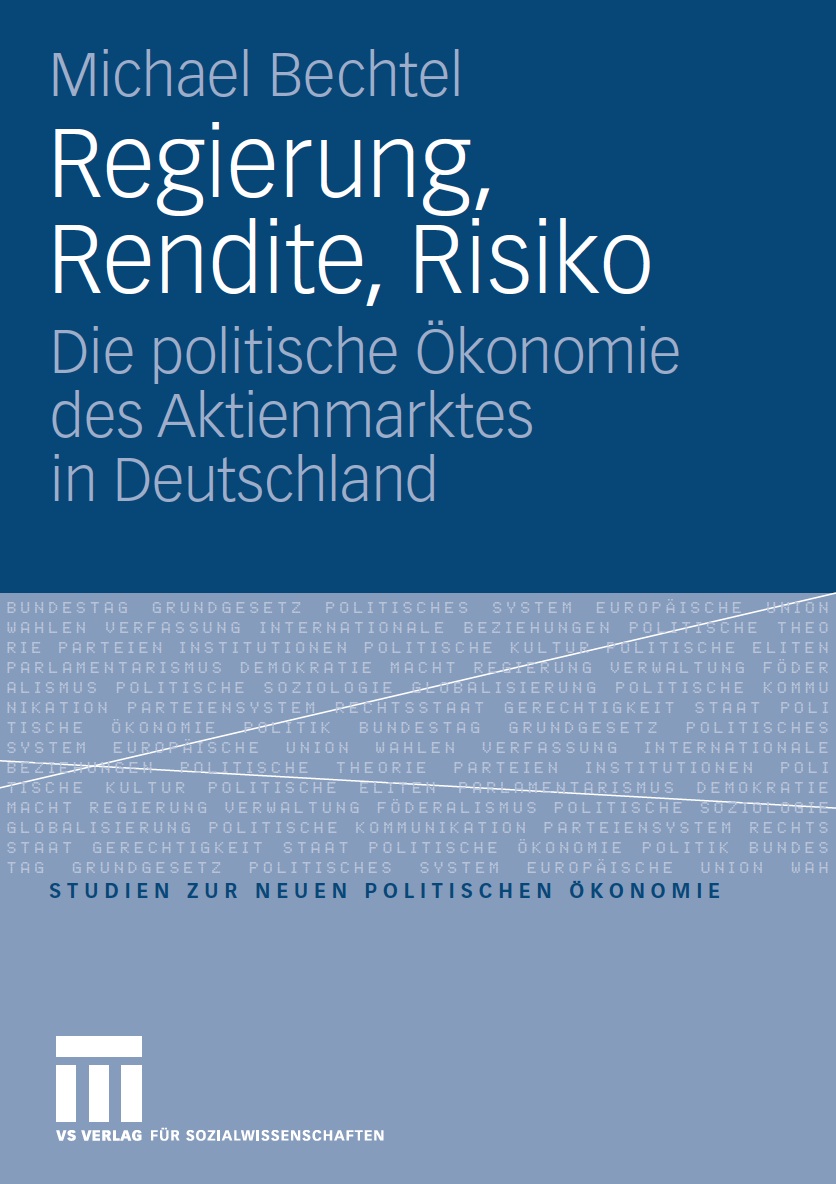
Regierung, Rendite, Risiko. Die politische Ökonomie des Aktienmarktes in Deutschland.
VS Verlag
Awards
- Winner of the DVPW Dissertation Prize awarded by the German Political Science Association (DVPW) for the best dissertation in political science published in 2009 – Download laudation
- Winner of the Suedwestmetall Best Dissertation Award. Awarded for the best dissertation in political science, economics, business administration, law, engineering, or computer sciences dealing with a topic relevant to sociopolitical conditions and/or industrial relations, University of Konstanz, 2009
Articles in Refereed Journals | Books | Articles in Edited Volumes and Special Issues, Review Articles | Other Writings
Articles in Edited Volumes and Special Issues, Review Articles, Policy Briefs
Article

Majorities prefer constant carbon costs over increasing cost schedules even if costs are high
with Kenneth F. Scheve and Elisabeth van Lieshout
Nature Climate Change 2021 (11), 909-910.
Download
Article
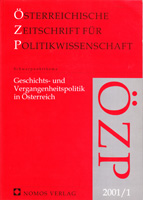
Tanzt auch die Politik auf dem Börsenparkett? Wahlen, Parteipolitik und die Entwicklung von Aktienmärkten
Österreichische Zeitschrift für Politikwissenschaft 2009 (2), 133-162
Download
Article

Wahlkreisarbeit zahlt sich doppelt aus – Zur Wirkung des Amtsinhaberstatus einer Partei auf ihren Zweitstimmenanteil bei den Bundestagswahlen 1949 bis 1998
with Jens Hainmüller and Holger Lutz Kern
Jahrbuch für Handlungs- und Entscheidungstheorie. Band 4. VS Verlag: Opladen, 11-45.
Download
Article
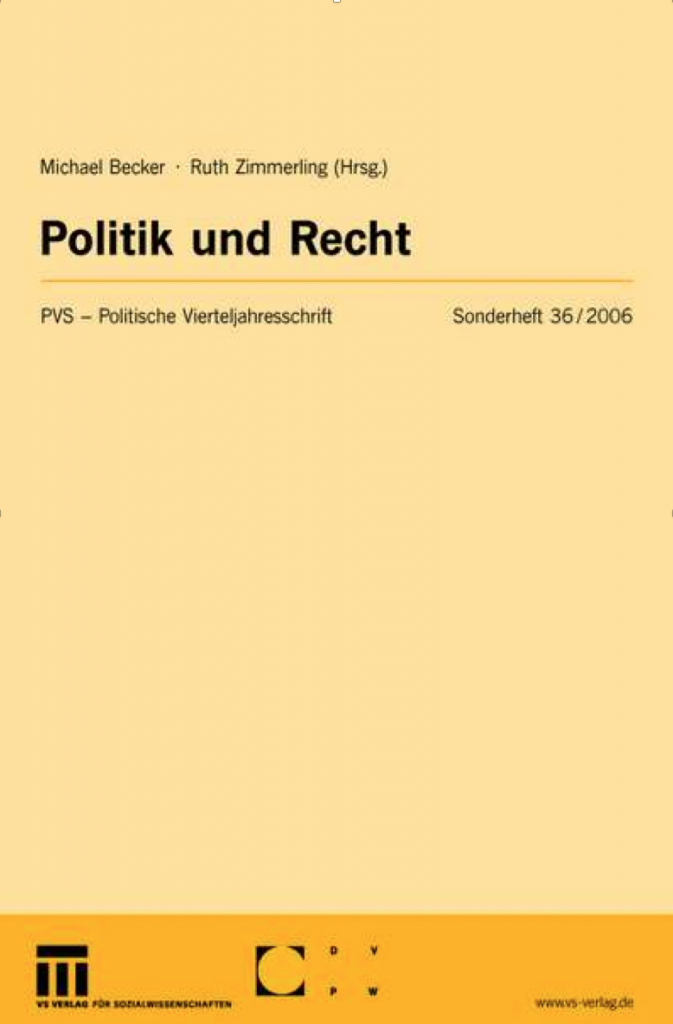
Gesetzgebungs- oder Justizstaat? Zum (Macht-)Verhältnis zwischen Bundesverfassungsgericht und Parlamentsgesetzgeber am Beispiel der aktuellen grundrechtsdogmatischen Entwicklung
with Alexis von Komorowski
In: Becker, Michael and Ruth Zimmerling (eds.) Politische Vierteljahresschrift Sonderheft 35 (2006), 282-305
Download
Other
- Kooperation und Fairness in der Politik, Wirtschaftspolitisches Zentrum Kommentar (13 Jul 2016) Read
- If Voting Were Mandatory, The Washington Post’s Monkey Cage (10/12/2015) Read
- How Can Countries Make Progress on Global Climate Policy, Huffington Post (23/09/2014) Read
- “Sell your islands, you bankrupt Greeks!” – Exploring Public Opinion Towards International Financial Bailouts (04/08/2012) Read
- Who Wants to Bail Out Other Countries and Why? (01/05/2012) Read
- What Will Make You a Swiss? Evidence from 30 Years of Naturalization Decisions in Swiss Municipalities (19/09/2011) Read
- Incentives versus Culture: Do Legal Norms Affect Preferences for Political Participation? (27/08/2011) Read
- The Electoral Effects of Arguments and Partisan Cues: A First Peek at Experimental Evidence from the Swiss Deportation Initiative (23/12/2010) Read
- The Effectiveness of Arguments in Direct-democratic Decisionmaking: Evidence from the Swiss Deportation Initiative (01/12/2010) Read
- Just Another Talk Shop? International Institutions, European Summits, and Financial Markets (16/08/2010) Read
- The World’s Most Expensive Seating Arrangement (31/05/2010) Read
- Floods and Elections: How Lasting is Voter Gratitude? (28/05/2010) Read
- Traffic Policemen, Overspeed Monitoring, and How to Recruit PhD Students in Political Science (15/03/2010) Read
